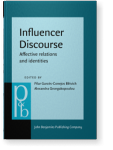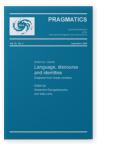Tereza Spilioti
List of John Benjamins publications for which Tereza Spilioti plays a role.
2024 Chapter 11. “Getting personal with you”: Affect and authenticity in confessional videos of YouTube lifestyle and beauty influencers Influencer Discourse: Affective relations and identities, Garcés-Conejos Blitvich, Pilar and Alexandra Georgakopoulou (eds.), pp. 278–301 | Chapter
Since the Middle Ages, confession has been one of the ‘most highly valued techniques for producing truth’ (Foucault 1978). While confessional monologues have been researched in reality TV discourse (Lorenzo-Dus 2009; Tolson 2006), the communicative potential of confessional talk for Social Media… read more
2024 Chapter 7. “The EU gave us a new beginning”: Liquid racism and affect in a curated migrant story Exploring the Ambivalence of Liquid Racism: In between antiracist and racist discourse, Archakis, Argiris and Villy Tsakona (eds.), pp. 181–201 | Chapter
In this chapter, we trace subtle forms of racism, known as liquid racism (Weaver 2010), in a personal experience story of a migrant’s journey, curated as part of a communication campaign about the European Union (EU). Our analysis of the story is based on the examination of its structure… read more
2020 The shared story of #JeSuisAylan on Twitter: Story participation and stancetaking in visual small stories Networked Practices of Emotion and Stancetaking in Reactions to Mediatized Events and Crises, Giaxoglou, Korina and Marjut Johansson (eds.), pp. 277–302 | Article
Despite an increased interest in the discourse representations of refugees in the media, little attention has been paid so far to the circulation and uptake of such portrayals in social media. This article addresses this gap by examining networked users’ reactions to the iconic image of Alan… read more
2009 Graphemic representation of text-messaging: Alphabet-choice and code-switches in Greek SMS Language, discourse and identities: Snapshot from Greek contexts, Georgakopoulou, Alexandra and Vally Lytra (eds.), pp. 393–412 | Article
The aim of this study is to investigate the choice of alphabetical encoding in Greek text-messaging (or Short Message Service, SMS). The analysis will be based on a corpus of 447 text-messages exchanged among participants who belong to the age group of ‘youth’ (15-25 years old) and live in Athens… read more



